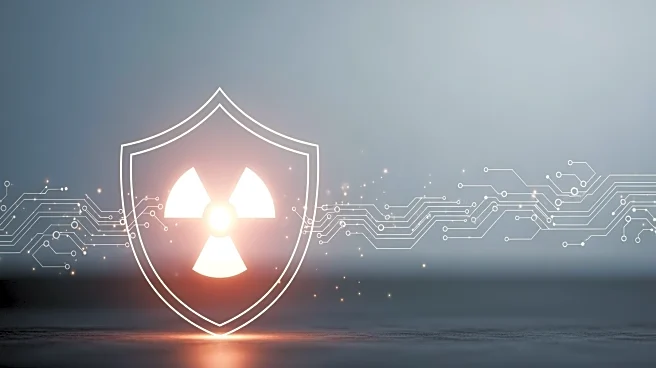What's Happening?
Ukrainian forces have successfully disrupted Russian plans to reconnect the Zaporizhzhia nuclear power station to the Russian grid, according to Ukrainian sources. The plant, Europe's largest, has been
under Russian control since early in the invasion and lost external power in late September. Ukrainian guerrilla fighters reportedly attacked substations behind enemy lines, damaging a new connection to the Russian grid via Mariupol. Power was eventually restored by linking the plant to Ukraine's grid. Energoatom, Ukraine's state nuclear operator, warned that the plant's backup generators were insufficient for prolonged use, risking nuclear safety. The International Atomic Energy Agency facilitated a local ceasefire to allow repairs.
Why It's Important?
The restoration of power to the Zaporizhzhia nuclear plant is crucial for maintaining nuclear safety and stability in the region. The plant's reliance on backup generators posed significant risks, including potential loss of control over nuclear safety systems. The successful Ukrainian intervention highlights ongoing tensions and strategic maneuvers in the conflict. The situation underscores the importance of international oversight, as demonstrated by the IAEA's involvement, to prevent nuclear incidents. The development also reflects the broader geopolitical struggle between Ukraine and Russia, with implications for regional security and energy independence.
What's Next?
Continued efforts to secure and stabilize the Zaporizhzhia plant are expected, with ongoing repairs to transmission lines. The situation may prompt further international diplomatic engagement to ensure nuclear safety and prevent escalation. Both Ukrainian and Russian forces may continue strategic operations around the plant, potentially affecting regional power dynamics. The IAEA's role in facilitating repairs could lead to increased international monitoring and involvement in the conflict. The broader implications for energy security in Ukraine and Europe remain significant, with potential impacts on energy policy and international relations.
Beyond the Headlines
The incident at Zaporizhzhia highlights the complex interplay between military conflict and nuclear safety. It raises ethical questions about the use of civilian infrastructure in warfare and the responsibilities of occupying forces. The situation may influence future international protocols on nuclear plant security during conflicts. Long-term, the event could drive changes in energy policy, emphasizing the need for diversified and secure energy sources. The role of international organizations like the IAEA in conflict zones may expand, setting precedents for future interventions.









